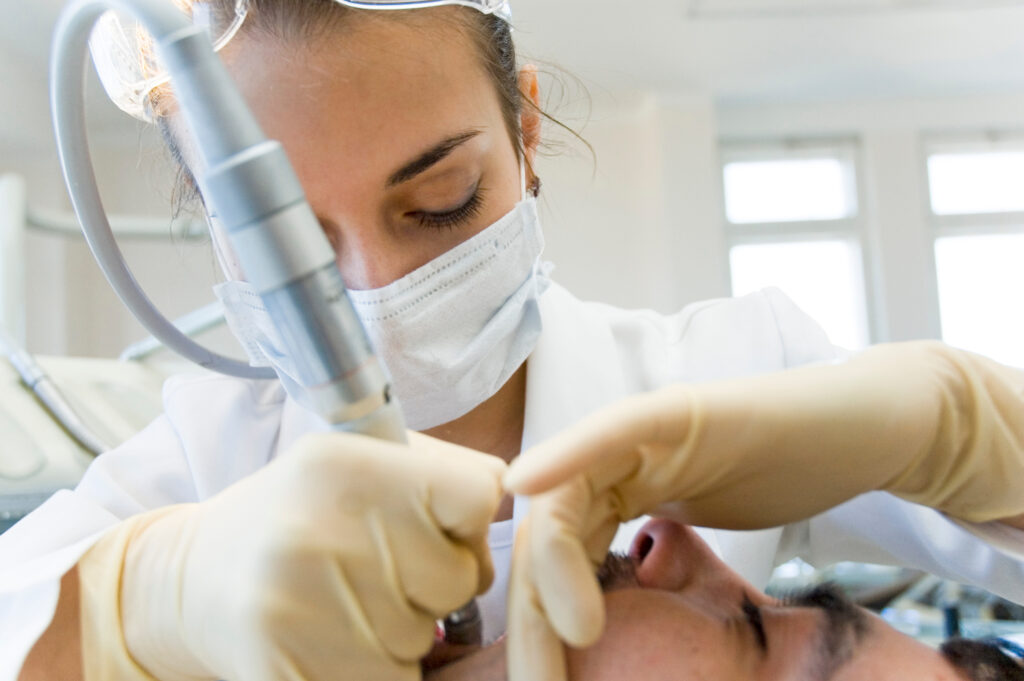Periodontal disease, often known as gum disease, is a common oral health condition affecting the gums and surrounding tissues. Gum disease has traditionally been treated by a dental hygienist in Edmonton with a variety of treatments, including scaling and root planing, surgery, and antibiotics. However, laser treatment has emerged as a possible option in recent years.
We’ll go through the benefits, drawbacks, and specifics of laser treatment for gum disease, shining light on this new approach to periodontal care.
What is Laser Treatment?
Laser treatment, also known as laser therapy or laser surgery, refers to the use of focused, intense beams of light to treat various medical conditions. “Laser” is an abbreviation for “light amplification by stimulated emission of radiation.” Laser devices generate light at a specified wavelength that can be altered depending on the application.
Due to its accuracy and less intrusive nature, laser treatment has grown in popularity in a variety of medical fields. It can be utilized for diagnostic, therapeutic, and aesthetic purposes. The laser beam can aim at specific tissues or parts of the body, giving regulated energy to produce the desired results.
In medicine, laser treatment is utilized for a wide range of conditions, including:
- Dermatology
- Ophthalmology
- Dentistry
- Oncology
- Gynecology
- Urology
It is essential to highlight that laser treatment should only be conducted by certified a dental hygienist near you who have acquired proper laser training. The laser employed, as well as the treatment method, will differ based on the medical condition being treated.
Advantages
Precision
Laser treatment enables for accurate targeting of certain tissues or locations while minimizing damage to healthy tissue in the surrounding area. This accuracy is especially useful in delicate or sensitive areas of the body.
Minimally Invasive
Laser operations are typically less intrusive than standard surgeries, requiring minimal or no incisions at all. This results in less bodily stress, less post-operative discomfort, and shorter recovery timeframes.
Reduced Bleeding
The concentrated laser light can close blood vessels as it cuts or vaporizes tissue, resulting in little bleeding throughout the process. This benefit improves visibility for the healthcare provider and decreases the necessity for extensive suturing.
Reduced Scarring
Due to its accuracy and minimal tissue damage, laser treatment in Edmonton can help to reduce scarring. When compared to traditional surgical approaches, the laser’s regulated energy promotes optimal healing, resulting in fewer visible scars.
Quicker Healing Time
When opposed to traditional approaches, laser treatment often leads to speedier healing and recovery. The energy of the laser can accelerate cell regeneration, improve tissue repair, and promote the body’s natural healing processes.
Reduced Risk of Infection
The laser’s high heat during treatment can effectively sterilize the treatment area, reducing the risk of infection. Furthermore, the less invasive nature of laser operations can reduce the likelihood of post-operative problems.
Outpatient Procedures
Many laser treatments can be performed as outpatient procedures, which means patients can usually go home the same day. This removes the need for hospital stays while also lowering healthcare expenses.
Versatility
Laser treatment is adaptable and can be used to treat a wide range of medical conditions in fields such as dermatology, ophthalmology, dentistry, cancer, and others. Lasers’ versatility enables personalized treatment plans adapted to particular patient needs.
Reduced Pain and Discomfort
When compared to traditional operations, laser treatments often result in less pain and suffering. The laser’s tailored energy helps reduce nerve discomfort, and the less invasive procedure can make patients more comfortable.
Improved Cosmetic Outcome
Laser treatment in cosmetic operations can improve the appearance of the skin, reduce wrinkles, eliminate unwanted hair, and manage pigmentation conditions. Laser treatment has the potential to deliver noticeable and long-term improvements in cosmetic results.
Disadvantages of Laser Treatment
Limited Availability and Expertise
Laser therapy may not be widely accessible in every healthcare facility. Laser operations need specialized equipment and expertise, which may limit access to specific locations or healthcare practitioners.
Cost
Due to the expense of the equipment, training, and maintenance, laser treatment might be more expensive than traditional treatment techniques. Patients should think about the cost impacts and if their insurance assists the surgery.
Skin Sensitivity and Pigmentation
Some people can be more sensitive to laser treatment or respond differently to it. Skin pigmentation can impair the effectiveness of some lasers, and darker skin tones may be more prone to pigmentation alterations or uneven skin tone after laser operations
Pain and Discomfort
While laser treatments are less unpleasant than traditional procedures in general, some discomfort can be felt during or after the process. Numbing creams or local anesthetics are often employed to alleviate pain, however individual pain tolerance varies.
Risk of Burns or Scarring
Although laser treatments are intended to be precise, there is still the possibility of burns or scarring if the laser intensity is not correctly managed or if the patient’s skin responds negatively. It is essential to follow post-treatment recommendations to reduce the possibility of issues.
Infection
While laser treatments can lower the risk of infection when compared to standard operations, infection at the treatment site is still possible. Strict compliance with post-treatment care recommendations, including adequate wound care, can help reduce this risk.
Eye Safety
To protect the eyes from laser beams, laser treatments near the eyes require additional care. During these treatments, both the patient and the healthcare professional must wear suitable eye protection.
Pre-existing Medical Conditions
Certain medical conditions or drugs might compromise the safety and effectiveness of laser treatment. Before having laser operations, it is essential to inform the healthcare professional of any current medical problems or drugs.
Potential Side Effects
Temporary side effects such as redness, swelling, bruising, itching, or changes in skin pigmentation can happen depending on the type of treatment used and individual reaction. These adverse effects are generally temporary and subside with time.
Schedule Your Session!
If you’re interested in learning more about laser treatment near you or seeking a consultation, we recommend visiting Floss Bosses. We are a reputable dental practice that specializes in laser dentistry and offers comprehensive oral care services. Our experienced team of dental professionals can provide you with detailed information about laser treatment for gum disease and address any concerns or questions you may have.
Visit us or contact the dental clinic to schedule an appointment and take the first step toward a healthier smile.

